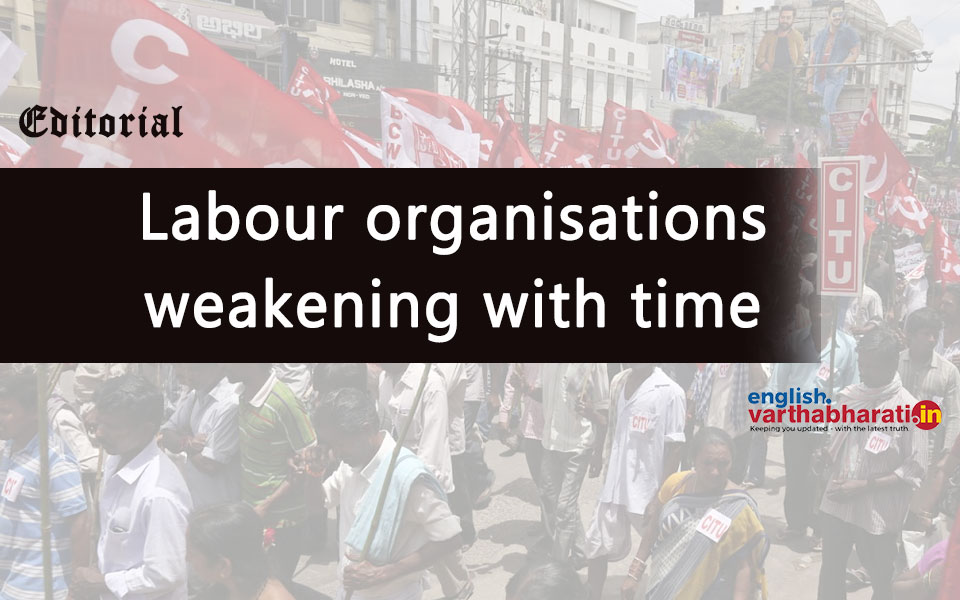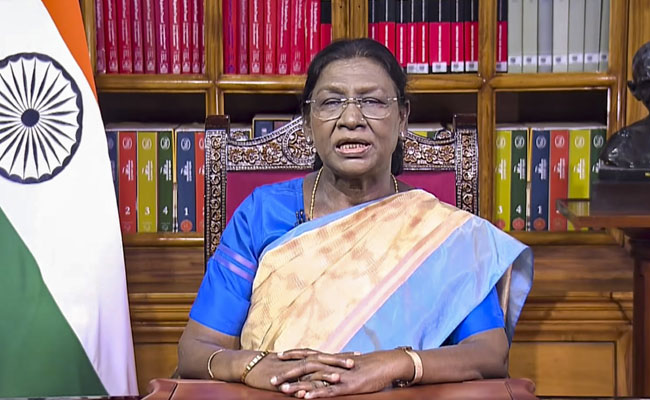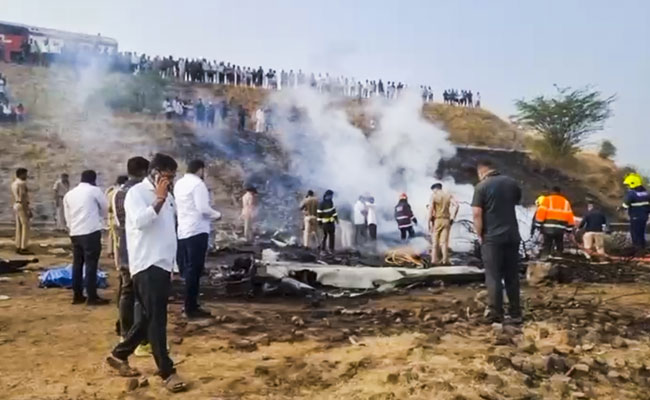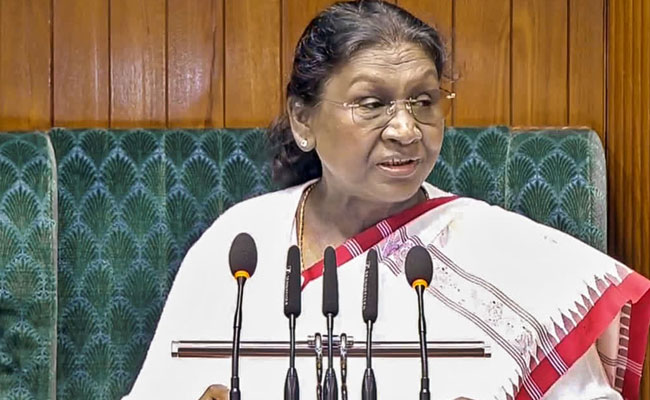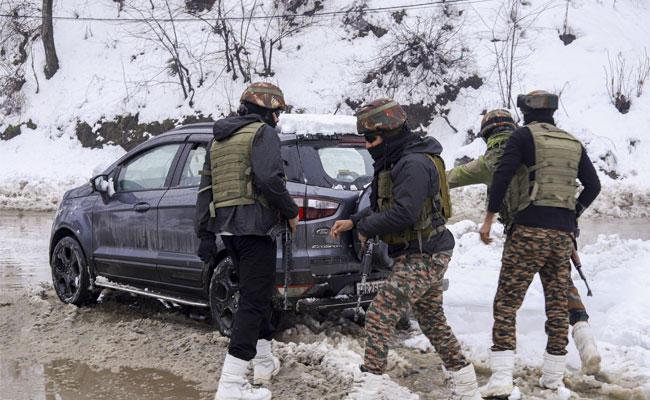About 20 crore labourers across the country from various outfits have called for two day national bandh to protest against the anti-labour policies and unilateral decisions regarding labour welfare programmes announced by the central government.
This bandh has been supported by 10 labour organisations. Two day bandh is really a big blow to the country’s exchequer. But then the central government has been implementing policies for labourers without consulting them about their opinion about proposed changes.
The government isn’t responding to the pleas submitted by labourers or even by two major rallies taken out by the farmers. Hence, to make the government listen to the labourers and others, such hard protest is much necessary. Except for Bharatiya Mazdoor Sanghatana which is the subsidiary of Sangh Parivar, all other labour organisations have supported this bandh.
There are two reasons why the anti-labour movements are getting implemented in the country. One is that the labour organisations have lost steam and weakened with time. Second one is that the labour organisations have been deeply politicized.
Hence the labour federations and organisations have to attend to the issues challenging the solidarity of labour collectives instead of getting down to solving their problems. Political parties have clearly mislead the labourers who came to show solidarity with them. The same labourers are now taking to streets in the name of religion and caste. They are identifying with the political parties that are implementing policies that are against their very welfare.
Only 8% of the total workers are in organized sector and the rest of 92% are in unorganized sector working under dire conditions and life challenges. The labour organisations and governments have to train their focus on them and find solutions to their problems. But then there are many challenges before the goal is accomplished. Women are in huge numbers in unorganized sector which is ever expanding. Information technology sector has posed a challenge to particular work atmosphere.
Now with modes of transportation having seen revolutionary changes overnight, private taxis like Ola and Uber have been witnessing complex issues that the country never witnessed before. Most of the public sector companies are worn out owing to the interference of the governments of their time.
But the government neither has plans nor is holding discussions with the labourers on schemes or packages for the rehabilitation of labourers or the organisations. The fixed hour work contract that was implemented in garment industry in 2016 is pro-industry and aids the employers to make terms according to their convenience instead of labour welfare. Now that policy has been implemented in all sectors.
As per that policy, the labourer can be removed from the job at any given time without prior notice, by the employer. Almost all the multinational companies are implementing the labour contract system has turned into a massive challenge since 1970 onwards.
With the labour federations and organisations facing the biggest challenge threatening their existence with pressure being mounted from every corner to eliminate them, how can they find solutions outside the political equations and situations? In fact even BMS with its RSS background has also objected to including MNCs and policies pertaining to labour into time bound contract and labour code bill of 2017.
The organization has sought to the government to present a whitepaper on the dependency of the government on MNCs and how many jobs have MNCs generated in the recent times. BMS had openly criticized the anti-labour approach of Modi government. But BMS stopped participating in nationwide bandhs since 2015 September even when the issues were about the safety and future of labourers.
The organization said they are more concerned about labour welfare than staging dharna or bandh or even indulging in politics. One of the core duties of organized labour sector is to facilitie tripartite discussions between joint labour federations, the government and employers to conduct meaningful discussions and find solutions for problems plaguing the sector.
Most labour organisations feel NDA government rejects any chance to hold discussions with the labour movements, feel the leaders of labour collectives. Labour welfare and shutting down of manufacturing units is not just owing to indiscriminate removing of people from jobs, but is also against the spirit of democracy.
Labour organisations owe it to people to take the real picture to them and make the labour welfare as people’s welfare. This has to be inclusive of labour welfare and public welfare too. Unless the labour sector becomes a political force to reckon with again, it cannot even dream of wielding political power. bandh will merely be something that people will never understand and complain against.
The question may arise about the government’s stance to this whole issue that having known govt’s unresponsiveness to this, why would the organisations still call a bandh? Labour organisations have to inform people that the core issue that is affecting manufacturing sector would have a bearing on everyone.
Labour movement has to become a common cause which would then ensure it would turn into a political power. Once when the parties know people and labourers are together, they will come down on their knees to fulfil the demands.
Let the Truth be known. If you read VB and like VB, please be a VB Supporter and Help us deliver the Truth to one and all.
New Delhi (PTI): President Droupadi Murmu on Wednesday said the world saw the valour of Indian armed forces through Operation Sindoor when they destroyed terror camps on the strength of their own resources and asserted that any terror act will be responded with decisive action.
"India has proved that power can be used with responsibility and wisdom. The world has seen the valour and courage of Indian armed forces through Operation Sindoor," Murmu said in her address to both Houses of Parliament, marking the beginning of the Budget Session.
"Our nation, on the strength of our own resources, destroyed terror camps. My government sent a message that any act of terror will be responded to with resolute and decisive action," the President said, amid thumping of desks by Prime Minister Narendra Modi and other parliamentarians.
Murmu said the suspension of the Indus Water Treaty was part of India's fight against terror.
"We are also working on Mission Sudarshan Chakra to further strengthen national security," the President said, adding that security forces have also taken decisive action against Maoist terror.
Following Operation Sindoor, she said, the trust on Indian defence platforms has increased.
Murmu further said her government was committed to social justice in the country.
In the third term of the government, she said, work is being done to further empower the poor, and social security benefits are available to nearly 95 crore citizens now.
"My government is committed to true social justice," she said, adding that 25 crore Indians moved out of poverty in the last 10 years.
The President also said the government has been successful in tackling corruption and scams, and ensuring proper use of public funds.
"For India, the end of the first 25 years of this century has been filled with several successes, proud achievements and extraordinary experiences. In the last 10-11 years, India has strengthened its foundation in every sector," she said.
Lauding India's celebration of the 350th martyrdom day of the ninth Sikh guru, Guru Tegh Bahadur, and the country's tribute to revered tribal leader and freedom fighter Birsa Munda on his 150th birth anniversary, Murmu said, "when the country remembers the contribution of its ancestors, the new generation gets inspiration, which further speeds up our journey towards Viksit Bharat (Developed India)."
"The country celebrated the 350th Shaheedi Diwas of Sri Guru Tegh Bahadur Ji. During the 150th birth anniversary of Birsa Munda, the entire country paid him tribute and remembered his contribution to the tribal community," the President said.
"The events related to the 150th birth anniversary of Sardar Vallabhbhai Patel further strengthened the sense of Ek Bharat, Shresht Bharat (One India, Best India). The entire country became witness to how Bharat Ratna Bhupen Hazarika's birth anniversary celebrations filled the country with music and a sense of unity," Murmu said.
The President's mention of the Viksit Bharat – Guarantee for Rozgar and Ajeevika Mission (Gramin) (VB-G RAM G) scheme was met with loud protests from the Opposition benches.
Murmu said the VB-G RAM G initiative would provide guarantee for 125 days of work, would stop corruption and leakages, and provide a new impetus to rural development.
The Opposition members raised slogans demanding its rollback, even as the treasury benches thumped their desk in support of the scheme.
The President had to take a brief pause amid opposition cries of "vapas lo" (roll back) against the Act that replaced the Mahatma Gandhi National Rural Employment Guarantee Act (MGNREGA).
The Opposition parties have been demanding withdrawal of the VB-G RAM G Act and restoration of MGNREGA as a rights-based law in its original form, the right to work and the authority of panchayats.
The government has, meanwhile, claimed that the new Act will further strengthen the guarantee for rural employment.

